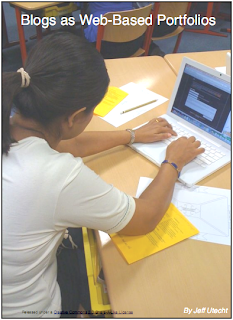
I was recently asked the questions,
"How do I start using e-Portfolios in a Primary school?" - An important question that needs a serious answer. But, in simple terms, as with much of education, my answer is simply,
"Start with the known and move to the unknown."
eFolio is exceptionally configurable to the needs of even the youngest children - a simple clear layout, in easy English, inviting the youngsters to take ownership of their eFolios right from the start. At this stage it should be noted that the eFolio is set by their age to be a private account and is not discoverable by search engines.
In discussion with eFolio staff, the teacher can decide what template, font styles and page tabs should be set as the default profile along with any scaffolding.
To begin with, say in yr5, it might be that only one task per term is asked for, and children find it very easy to start off with a topic such as 'All about ME!' Once the children are comfortably working at this writing task, it might be that the teacher asks the children if they have a digital photograph at home that they would like to use in their eFolio. This then becomes a great opportunity to get parents/carers involved. The teacher, at this stage, will have to enable access for the parents who can then assist in uploading an appropriate image to their eFolio. (removing the task from the teacher!)
Perhaps, in the next term, children could be asked to write about 'My favourite school subject(s)'. This, as with the previous topic, allows not only the teacher to understand more about each individual child and their backgrounds but also begins to help parents have a better insight as to their child(ren)'s learning.
Thirdly, children begin to develop their own identity through working on a further page, 'My hobbies and clubs'. By this time the children will have begun to develop their own self-identity within their eFolio and could be encouraged to allow two or three of their closest friends to have access to each other's sites. This will enable formative feedback, polls, surveys, Likart scales or peer review and thus stimulating the documentation of discussions often left uncaptured in the normal classroom environment.
In yr6 it might be that teachers want to start encouraging children to think about transition to 'the big school'. An enduring theme can start with the title, 'In the Future' - which could be as imaginative as the teacher wants. The student may change this title at a later date to 'When I grow up', and even later, 'My Career plans'. Apart from anything else, this begins to establish the concept of the e-Portfolio as being an ever-living, lifelong and ever changing document.
Another useful page could be, 'My awards and honours' which begins to document any credentials that the student feels are applicable. This might encourage the use of scanned images or additional photographs. I have found this particularly useful when interviewing children before their transition to Secondary school. In later years this section will provide links to the Learning Records Service (ex MIAP).
 My friend Jamin Lietze wrote a very interesting post back in May. I have a very high regard for the work that he has put into developing e-Portfolio understanding for Primary schools in NewZealand. However, he raised an issue that I first came across in the work of John Pallister (some 4 years ago) in the UK and his work for MOSEP.
My friend Jamin Lietze wrote a very interesting post back in May. I have a very high regard for the work that he has put into developing e-Portfolio understanding for Primary schools in NewZealand. However, he raised an issue that I first came across in the work of John Pallister (some 4 years ago) in the UK and his work for MOSEP.



